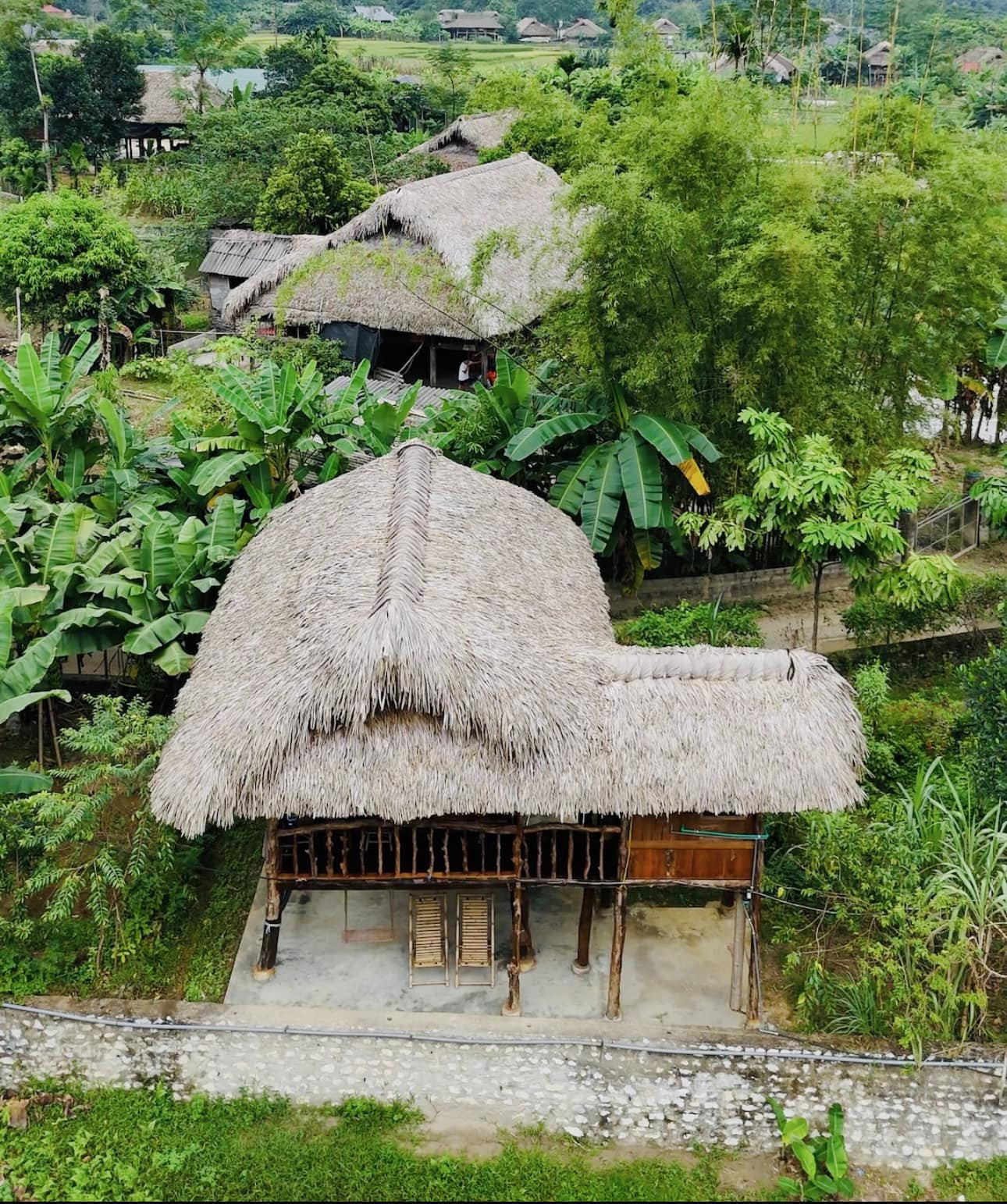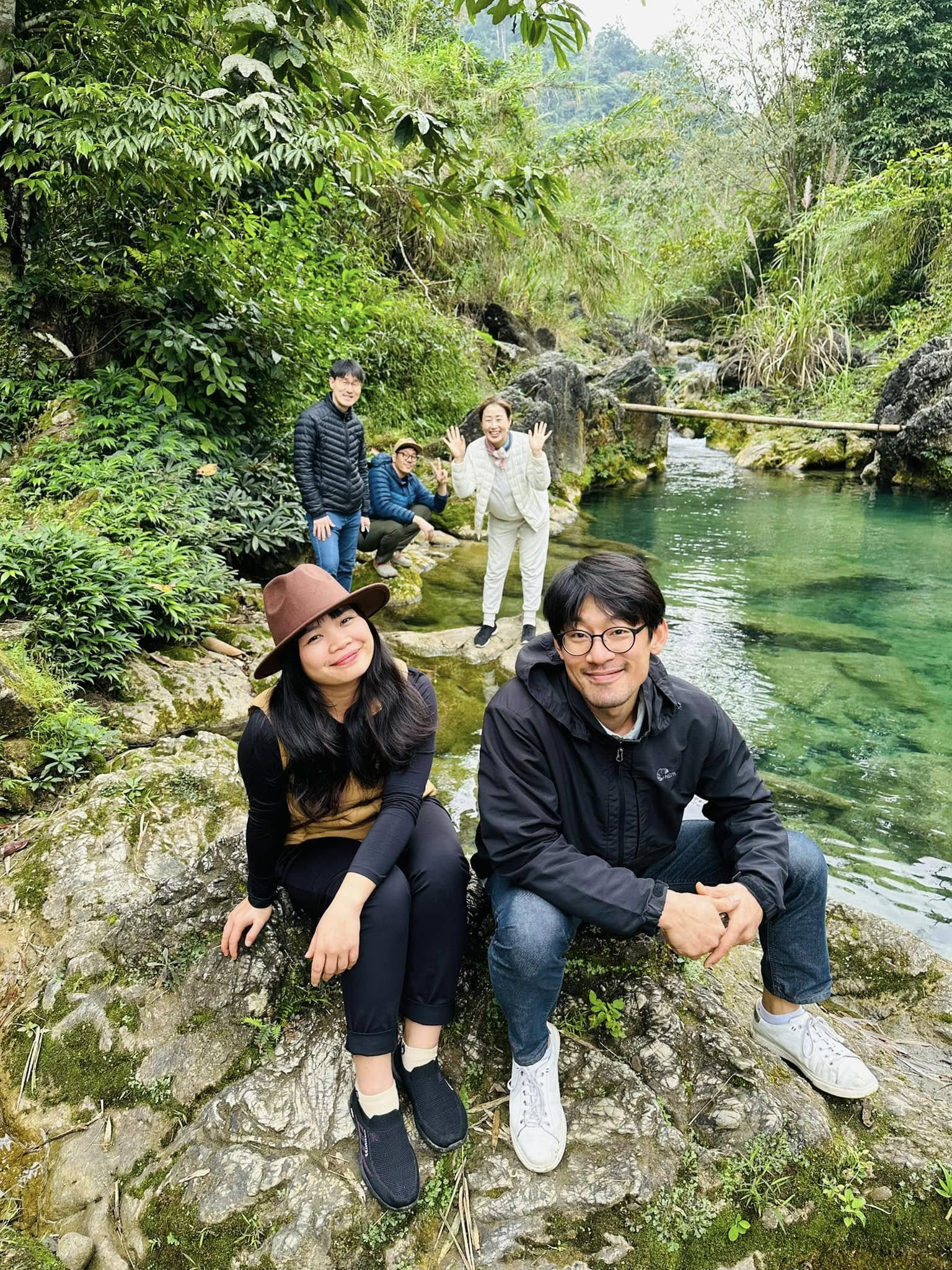
Nearly a decade ago, Lam Thuong was an obscure spot on the Northwest tourism map. When Yen Bai was mentioned, tourists only thought of Mu Cang Chai, Ta Xua’s “dinosaur spine,” Khau Pha Pass, or Thac Ba.
“Back then, guiding foreign groups from North to South, I kept thinking about why our village, a very beautiful village with lush mountains, clear streams, rustic Tay ethnic minority stilt houses, and friendly people, wasn’t explored,” Xoi, 33, recalled.
Xoi dreamed of bringing tourists to her village. They would wake up early in the morning, open the stilt house door, and see clouds drifting over the village, and smoke curling from palm-leaf roofs, she thought.
They could leisurely cycle or stroll through fields, breathe fresh air, join locals in climbing mountains, trekking forests, gardening, rice planting, learning folk songs, singing Then, or playing the Tinh lute.
“For nearly a decade, I’ve worked to turn that dream into reality,” Xoi said.
Lam Thuong Valley now attracts many international tourists to experience life with local Tay people. From September to December and February to April each year, Xoi’s family farmstay is 60-70 percent booked.
From a simple communal stilt house, Xoi has built five bungalows and four private rooms, hosting up to 50 guests per night. More homestays have sprung up in this highland village.

Xoi’s university dream
"The first person who inspired me to study was my grandfather," Xoi said. Her grandfather was the son of a mandarin who governed this area, had a high school diploma, and spoke French very well.
In primary school, she always studied hard. When she reached high school, the district school was 8km away from home, on a bumpy dirt road, but Xoi still went to school regularly.
Among subjects, Xoi loved English most, despite lacking access to computers or the internet. Her village had no tourists with whom to practice speaking English.
Passionate about languages, Xoi set her sights on becoming a tour guide. She studied hard and passed the entrance exam for the Tourism Department at the University of Social Sciences and Humanities.
“My parents supported my decision to leave for Hanoi for university education to chase my dream, but it was tough for our family. City living costs were high, and our only income came from rice farming,” Xoi said.
“I studied hard, sought internship opportunities at companies to practice my language skills, serve tourists, guide tours, manage operations, and promote destinations,” she added.
After graduation, Xoi worked for an inbound tourism company specializing bringing international tourists to Vietnam.
While guiding tourists throughout the country, Xoi saw the potential for independent and experiential tourism, sparking her idea to develop tourism in her hometown.
In 2017, with VND50 million saved from work, Xoi persuaded her parents to renovate their traditional Tay house in Tong Pinh Cai into a communal stilt house for guests.
In December 2017, the first guest arrived. The next year brought few visitors and no profit, but Xoi stayed determined.
She studied marketing, communications, architecture, management, and farmstay operations. She built a website about Lam Thuong, showcasing experiences and guest reviews, and promoted it on tourism groups.
During this time, Xoi traveled between Hanoi and Yen Bai. Wherever she guided tours, she learned how locals ran tourism to apply to her farmstay.
Her efforts have paid off: since 2021, the farmstay has received more travelers. Peak months have brought 40-50 guests, quieter ones around 20, with some staying a week.
In early 2025, Xoi returned to the village full-time to focus on developing experiential services.
Western tourists till soil
Xoi’s home sits near an elementary school, alive with children’s laughter, facing vast rice fields, with a fishpond and stream behind.
Visitors there are "healed" by the life of the indigenous people: In the morning, they hoe the land to grow vegetables, at noon they light the fire to prepare meals, in the afternoon they go to the fields to work, plant rice, dry bamboo shoots, and in the evening they learn folk songs with the host.
Xoi blends nature and cultural exploration, tailoring schedules to each guest’s preferences.
From Tong Pang or Tong Pinh Cai, guests cycle or trek short distances to Khuoi Luong stream or Nam Chan waterfall. They swim in clear, cool water or let fish nibble their feet. For trekking enthusiasts, Xoi suggests Khai Trung and Tham Duong caves, Lung Trang and Khau Chau Mountains.